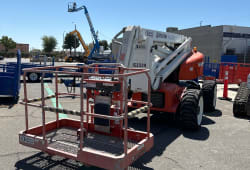Understanding the Value and Cost of Procore Construction Software
4 Min read
)
April 5, 2025
Procore is one of the most popular construction management software solutions, helping contractors, project managers, and construction firms streamline their operations. However, many companies hesitate to adopt it due to concerns about the cost of Procore construction software. In this article, we'll break down the annual cost of Procore construction software, what factors influence its pricing, and whether it's worth the investment.
What is Procore Construction Software?
Procore is a cloud-based construction management platform designed to improve efficiency across project planning, budgeting, scheduling, and collaboration. It integrates with multiple construction safety management software and financial tools, making it an all-in-one solution for construction companies.
Key Features:
Project Management: Streamlines planning, scheduling, and progress tracking.
Document Control: Centralized storage for RFIs, submittals, and blueprints.
Cost Tracking & Budgeting: Helps prevent cost overruns with real-time financial oversight.
Construction Safety Management System: Enhances job site safety through compliance tracking and reporting.
Mobile Accessibility: Allows field teams to update data from any location.
Why is Procore Important for Construction Companies?
1. Improved Collaboration
With cloud-based access, teams, subcontractors, and stakeholders can communicate in real time, reducing project delays and miscommunication.
2. Enhanced Project Efficiency
By consolidating project data in one place, Procore eliminates the inefficiencies of manual tracking and fragmented software.
3. Better Budget and Cost Control
Procore helps construction firms track costs, forecast expenses, and prevent budget overruns by providing real-time financial data.
4. Increased Safety Compliance
With built-in construction safety management tools, Procore ensures compliance with OSHA and industry safety standards, reducing the risk of accidents and fines.
Factors Affecting the Cost of Procore Construction Software
:format(webp))
The cost of Procore construction software is not fixed—it varies based on several factors:
Company Size: Larger firms with multiple users will pay more.
Subscription Plan: Different pricing tiers are available based on features.
Customization & Integrations: Custom features and integrations increase costs.
Support & Training: Additional costs may apply for implementation and employee training.
Annual Cost of Procore Construction Software
Unlike many other software providers, Procore does not publicly disclose its exact pricing. However, estimates suggest the annual cost of Procore construction software ranges between $4,000 and $20,000 per year, depending on company size and feature selection.
Procore Pricing Plans: Breakdown of Costs
Small Contractors: Estimated at $4,000 - $6,000 per year.
Mid-Sized Companies: Typically range from $10,000 - $15,000 per year.
Large Enterprises: Costs can exceed $20,000 per year, with enterprise-level customization.
Procore follows a custom pricing model, meaning businesses must request a quote to get exact pricing for their needs.
Is Procore Worth the Investment?
Pros:
✅ Comprehensive Construction Management: Reduces inefficiencies by centralizing all project data.
✅ Better Financial Oversight: Prevents budget overruns with real-time tracking.
✅ Enhanced Safety Compliance: Reduces workplace risks and OSHA violations.
✅ Scalability: Works for small, mid-sized, and large construction companies.
Cons:
❌ High Cost for Small Firms: May not be cost-effective for very small contractors.
❌ Learning Curve: Requires training to maximize benefits.
❌ Custom Pricing Model: Lack of transparent pricing makes cost estimation challenging.
How to Get the Best Deal on Procore
If you're considering Procore, here are some tips to ensure you get the best deal:
Request a Custom Quote – Speak to a sales rep to negotiate pricing based on your needs.
Compare with Competitors – Look at alternatives like Buildertrend, PlanGrid, and Autodesk Build.
Use Free Trials & Demos – Test the software before committing to a full subscription.
Ask About Discounts – Some vendors offer special pricing for long-term contracts.
Conclusion
The cost of Procore construction software can be significant, but for companies managing large projects, the investment is often justified. With its project management efficiency, cost-tracking tools, and construction safety management system, Procore helps firms reduce errors, increase profitability, and maintain compliance. If you're running a construction business and need a comprehensive project management solution, Procore may be worth considering.

Caleb Woods is an experienced content specialist and an editor at Boom & Bucket, blending his journalism background with expertise in the heavy equipment industry. He delivers engaging, informative content to help professionals stay informed and make smarter decisions in the machinery market.











